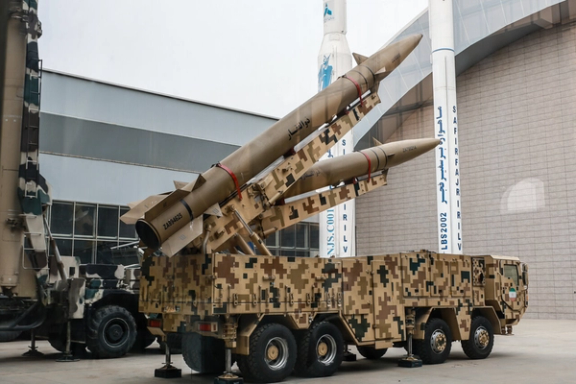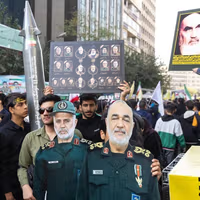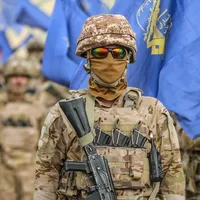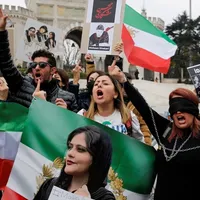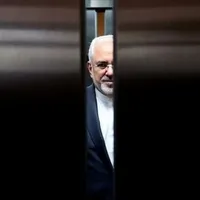Iran vows harsher response to any Israeli counterattack
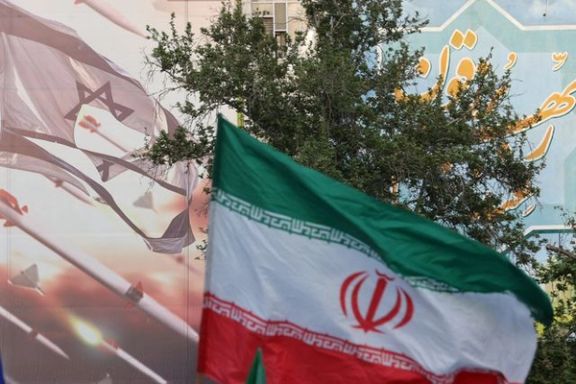
Iranian officials not only continued to threaten Israel on Monday but also glorified the October 7 Hamas attack as the anniversary passed without the anticipated Israeli retaliation.

Iranian officials not only continued to threaten Israel on Monday but also glorified the October 7 Hamas attack as the anniversary passed without the anticipated Israeli retaliation.
Vice President Mohammad Reza Aref, in an interview with ISNA, said the threats against Iran after last week's missile barrage were "a joke" as Israel bided its time to respond.
Iranian military leaders spoke defiantly as the country prepared for certain retaliation. Abdolrahim Mousavi, Commander-in-Chief of Iran’s Army, stated that Lebanese Hezbollah, Iran's largest proxy, had inflicted “severe” blows on Israel, and further violence would lead to “harsher” Iranian responses. "If the Zionists commit a crime in response to the reply we gave them, they will undoubtedly receive a stronger and more destructive response," Mousavi said.
They did not acknowledge that Iran's response to the killing of Iran-backed Hamas leader Ismail Haniyeh was only carried out two months later, and on the back of the killing of Hezbollah leader, Hassan Nasrallah.
Meanwhile, Israel's Kan 11 reported that the United States had offered Israel a “compensation package” if it refrained from attacking specific Iranian targets. This package reportedly included comprehensive diplomatic protection and a weapons package, according to American officials involved in the negotiations.
As Israel mourned the one-year-anniversary of the October 7 atrocities, in which 251 people were taken hostage to Gaza and 1,100 mostly civilians were killed, the official X account of Supreme Leader Ali Khamenei in Hebrew stated, "The Al-Aqsa Storm operation", another name for the October 7 attack, "set the Zionist regime back by 70 years."
With the country in mourning, many Israelis felt the timing of a retaliation would be inappropriate on the day when ceremonies around the country focused on those lost and the people still held in captivity.
In an interview with Fox News on Sunday, Israeli Defense Minister Yoav Gallant stated that “everything is on the table” and that Israel would respond to the unprecedented Iranian attack "in the manner of our choosing, and at the time and place of our choosing."
Expectations of an Israeli strike grew on Sunday night as Iran locked down flight paths on the eve of the one-year anniversary of the Hamas attack, but Iran’s Civil Aviation Organization lifted flight restrictions late Sunday night.
Iran's First Vice President said that "no threat [of retaliation] can make us retreat from our plans and actions; we will continue our path firmly", as Iran's proxies around Israel continue to send missiles to the Jewish state.
Adding to the rhetoric, Iran’s National Security Commission also reviewed the country's preparedness for possible Israeli retaliation. Ebrahim Rezaei, the commission's spokesperson, noted that key Iranian military and security institutions, including the IRGC and the Ministry of Defense, presented reports on their readiness to face threats.
As tensions continue to mount, both sides seem poised for a potential confrontation amid a bitter psychological war. While Iran maintains its threats and displays of defiance, Israel's promised response remains to be seen, leaving the region on edge, awaiting the next move.

As Israel mourns the more than 1,100 deaths from October 7 and the 101 hostages still held by Iran-backed Hamas in Gaza, the country awaits a response to last week’s Iranian missile barrage.
While honoring the fallen, including hundreds of IDF soldiers lost in the war in both Gaza and south Lebanon in Israel’s war against Iran’s proxies, the country still wonders when Prime Minister Benjamin Netanyahu will wreak the revenge promised for last week’s 181 ballistic missiles, an underlying topic which bubbles beneath the surface.
The assassination of Hezbollah leader Hassan Nasrallah boosted the premier in public opinion amidst the country’s longest war, and now, Israelis want more. The mood was dampened soon after, however, as at least nine soldiers fell in Israel’s ground operation in southern Lebanon.
Just like Iran’s delayed retaliation to the July 31 killing of Hamas political leader Ismail Haniyeh in Tehran, Israel is biding its time, allowing the country to enjoy celebrations, albeit muted, for the new year, and now, the commemorations of October 7, in peace.
Not only is this a psychological war, but Israel must now weigh its options along with its powerful ally, the US, which has warned the response must be “proportional”.
President Joe Biden, known for his softly softly approach to Iran, still wields power over the Jewish state, with Israel’s Defense Minister, Yoav Gallant, scheduled to visit the US to discuss strategy on Wednesday.
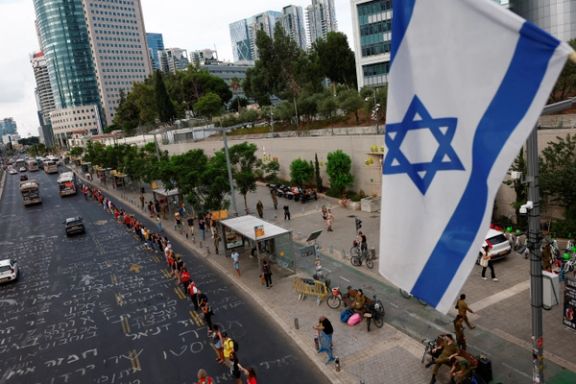
On Monday, marking one year since the bloodshed of October 7, when Iran-backed Hamas launched an air, land, and sea invasion of Israel, Israeli media focused on those lost in the deadliest single day for Jews since the Holocaust. The attack shocked the world, targeting one of the most militarily advanced nations.
But Iran is always lurking behind the scenes. Danielle Edelstein, a mother of four who lives in Tel Aviv, told Iran International: “Of course none of us knows what’s going to happen, but something has to happen. Last week’s attack was something no state can tolerate.”
For Netanyahu, whose popularity fluctuates almost daily, the response is crucial to his political survival. With each reminder of the horrors of October 7, the growing resentment toward Israel’s longest-serving premier becomes increasingly evident.
Israel’s Maariv newspaper surveyed the country last month, finding 47% felt he was most suitable for Prime Minister, even before the assassination of Nasrallah. That was a huge boost from polls in the wake of October 7 when around 70% of the country called for his resignation.
Last week, a Channel 12 poll also showed that Netanyahu’s Likud party would win a new election.
It has been the result of a series of killings, including leader of Hamas’s military wing, Mohammed Deif, in Gaza, the brazen killing of Haniyeh in Tehran, though Israel did not admit responsibility, and most recently, Nasrallah.
The IDF has been steadily wiping out the leadership of Hezbollah as airstrikes pound the group designated in countries such as the UK, US and Europe.
“We needed to see he was doing something,” said Ruthy Tuito, whose son is in the reserves. “We had so much inaction for such a long time, that these things give us hope that the government is standing up to the threats,” she told Iran International.
On Monday morning, marking the one-year anniversary, while commemorations were held at killing sites, Hamas launched more missiles at the time of the attacks last year, sirens first heard at 06:29.
Meanwhile, Hezbollah continued its assault on Israel’s north as the IDF pounds military infrastructure and advances airstrikes in Hezbollah infrastructure in Beirut.
Iran’s proxy in Iraq also sent projectiles in the early hours of Monday morning, intercepted by the IDF, identifying the source only as “from the East”, usually reflective of those coming from Iraq.
“This isn’t going to end without some kind of more affirmative action,” said Roni Avrahami, who has been serving in the reserves since the beginning of the war. “No country can live like this. Nobody wants more war, but we need to take action and we need our allies to stand by us in the process. This is not an enemy which deals with diplomatic solutions.”
Israel is already battling threats on all its borders, the Iran-backed Houthis in the south on the Red Sea coast, and proxies in Syria, Lebanon, Gaza, the West Bank, and Iraq.
But for now, the question is when, not if, the country will retaliate for the second attack from Iran this year, and one which no nation would be able to let pass.
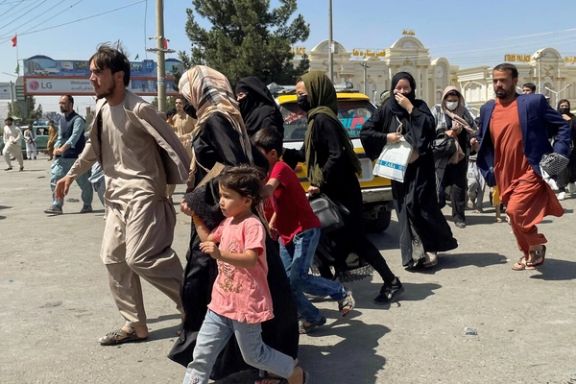
Iran has intensified its deportation efforts, aiming to expel at least two million undocumented migrants by the end of March 2025, according to Ahmad Reza Radan, commander of Iran’s law enforcement forces.
"Our goal this year is to return and deport at least two million illegal foreign nationals to their countries," Radan said Saturday in an interview with IRNA, the official government news website.
Although Radan did not explicitly mention any nationality, the term “foreign national” is widely used by Iranian officials and media to describe Afghan nationals, who constitute the overwhelming portion of the migrant population in Iran. United Nations refugee agency UNHCR estimates that nearly 4.5 million Afghan nationals currently live in Iran. However, recent estimates mentioned in the Iranian media say the population has swelled to nearly 10 million Afghans - or more than 10 percent of the country's population.
Over 500,000 people have already been arrested and deported, and more than 250,000 have voluntarily turned themselves in, bringing the total of those deported to 750,000 according to Radan.
"We cannot allow some individuals to enter the country illegally, reside, and work. Citizens and business owners should know that employing these individuals and housing illegal foreign nationals is a crime," Radan added.
This comes as part of a broader crackdown that has seen increased deportations and stricter regulations on residency.
There has always been a steady influx of Afghans into Iran, with the migrant population estimated at around 2.5 million over the past decade. However, after the Taliban's takeover of Afghanistan, the numbers surged, with millions crossing the border. Many Iranians blame the Islamic government for not sealing the border, suspecting it of harboring intentions to use Afghans as foot soldiers—both to control the disgruntled domestic population and as fighters in Middle East conflicts.
In August, Mohammad Rashidi, a member of parliament's presidium, introduced a bill to amend the laws governing the entry and residence of foreign nationals in Iran, with the goal of reducing the foreign national population by 10 percent annually.
On Sunday, Valiollah Bayati, spokesperson for the parliament’s internal affairs commission revealed that under the proposed plan, "there will no longer be provisions for permanent residency" for foreign nationals in Iran, and only temporary permits of one year, three years, or possibly seven years will be offered.
1.3 million Afghans were deported from Iran last year with more than 20,000 of them being children, and many of them unaccompanied.
With 2 million deportations planned in the next six months, these measures look set to intensify the difficulties faced by Afghan migrants and refugees, raising concerns about the broader social and humanitarian implications for the population fleeing Taliban rule in war-torn Afghanistan.
The Taliban-controlled Bakhtar News Agency reported that 241 Afghan families were deported from Pakistan and Iran on Friday.
Many Afghan nationals who are now at risk of deportation under this plan include women and former government employees who fled fearing persecution. Under the proposed plan, it is becoming increasingly difficult for these groups to secure long-term legal status in Iran, leaving many vulnerable to deportation.
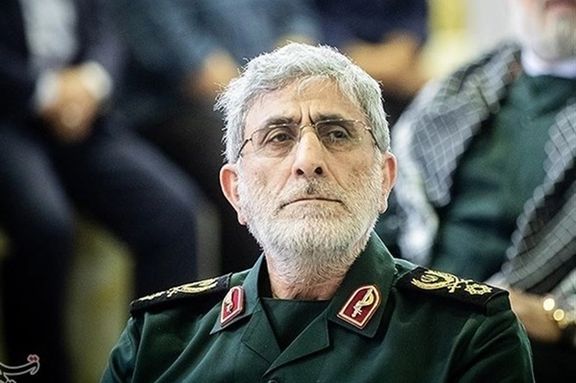
Informed sources have told Iran International that even the family of Quds Force commander Esmail Qaani remains unaware of his current status, as the IRGC has yet to release any official statement regarding his fate.
Reports emerged on Saturday that Qaani might have been in Beirut following the death of Hezbollah leader Hassan Nasrallah and continued Israeli air strikes on position of the Iran-backed group. No one has heard about Qaani since October four and there are speculations that he might have been killed or injured in Israeli air strikes.
A targeted airstrike, which aimed to eliminate Hashem Safieddine, a senior Hezbollah leader and potential successor to Hassan Nasrallah, has raised speculation about Qaani’s possible presence at the bombed location. The New York Times, citing three unnamed Iranian officials, reported that Qaani had traveled to Lebanon last week to meet with Hezbollah officials in an effort to strengthen the group.
Reuters also reported on Sunday that according to Iranian officials Qaani has not been heard from since Friday. Senior Hezbollah official Mahmoud Qmati told Reuters: "I have no information, we are also searching for the truth of this matter."
While Israel’s Channel 12 suggested that Qaani might have been injured in the attack, there has been no confirmation from Iranian authorities. A Lebanese security source told Reuters that communication with Safieddine has been cut off since the strike, further fueling concerns about high-level casualties among Hezbollah leadership.
Qaani’s absence from key government ceremonies in Iran, including an event where Supreme Leader Ali Khamenei awarded a military badge to IRGC Aerospace Forces commander Amirali Hajizadeh, has only added to the growing uncertainty. Iran has not released any recent photos or videos of Qaani.
Meanwhile, in a sign of heightened tensions and amid fear of possible Israeli retaliation for last week attack, Iran's Civil Aviation Organization has canceled all flights from Sunday evening to Monday morning, citing "operational limitations." This follows a pattern seen in April when Iranian flights were suspended for nearly 48 hours after Iran launched missile attacks on Israeli positions.
At the same time, Israeli Defense Minister Yoav Gallant responded to recent Iranian actions with a stern warning. "Whoever thinks that a mere attempt to harm us will deter us from taking action should take a look at Gaza and Beirut," Gallant stated, referring to the October 1 Iranian missile strike on two Israeli air force bases. Gallant emphasized that no Israeli aircraft or squadrons were damaged in the strike.
As tensions escalate, both sides are preparing for potential further confrontations, with Iran threatening reciprocal action if Israel launches any new attacks. Iran closed its airspace Sunday night until Monday morning.

Gasoline supply in Iran faced abrupt changes on Sunday, with new limits imposed on daily refueling and fuel station allocations, sparking concern about potential price hikes.
The government that controls fuel products announced that vehicle owners using its rationing system of smart fuel cards are now limited to fueling "twice a day," with a maximum of 50 liters per session.
The new directive reduces the previous refueling limit of 60 liters to 50, although the monthly quota of 300 liters remains unchanged. However, officials did not provide any explanation or the reason for the daily refueling reduction, a move that has alarmed the public and some media outlets.
Under a plan announced in 2023, about 70% of citizens can receive 30 liters of gasoline per refueling session in small towns and 40 liters in large cities.
However, until Iran’s second attack on Israel last week, during which 181 ballistic missiles were fired at the Jewish state, the plan had not been implemented in the capital, where Tehran residents could still refuel up to 60 liters as before.
As Israel has vowed retaliation as a national duty, Iran's critical infrastructure, including refineries are now in the firing line.
Although Iran has one of the world's largest oil reserves, it suffers from gasoline shortages due to the limited refining capacity. President Masoud Pezeshkian raised the issue of higher gasoline prices during the election campaign, but after the victory, his cabinet’s statements were contradictory.
In August, Pezeshkian said in a speech: "There is no logic in buying gasoline at the free market dollar rate and selling it to the public with subsidies."
The remarks faced negative reactions from social media users.
Economic journalist Reza Gheibi, in an interview with Iran International, warned that "increasing gasoline prices" is the government’s ultimate goal. He predicted further measures, including cutting individual quotas and raising both free market and subsidized gasoline prices in the coming years.
Gheibi emphasized that “the current restrictions are a prelude to price hikes, which could trigger social unrest akin to the 2019 protests” that erupted following a 200% gasoline price increase. Those protests saw widespread anti-government demonstrations, which were met with crackdowns, with reports suggesting over 1,500 people were killed by security forces.
The timing of the new fuel restrictions coincides with a major energy crisis in Iran. This summer, the country faced a 20,000-megawatt electricity deficit and a shortage of natural gas, forcing power plants to rely heavily on diesel and fuel oil, both of which have seen dramatic consumption increases. Fuel oil now accounts for 25% of power plants' fuel supply, and this figure is expected to rise to 50% by winter.
According to the Ministry of Oil, Iran's strategic diesel and fuel oil reserves would last only 10 days if no additional fuel is provided for industrial or transportation purposes, raising fears of a prolonged energy crisis. The country's gasoline reserves are also critically low, with only enough fuel to cover one week of domestic demand if consumption spikes during the winter months.
Israel’s reported consideration of targeting Iran's oil refineries as part of a potential retaliation could further cripple the country's energy sector. The loss of refineries such as Persian Gulf Star or Abadan would wipe out 30% of Iran's fuel production, exacerbating the shortages. A single strike on the Kharg oil terminal could cut off 90% of Iran’s oil export capacity, dealing a blow to the economy.
A loss of refinery capacity or further cuts in fuel supplies could plunge the country into hyperinflation, driving poverty levels even higher amid an inflation rate already exceeding 40%.
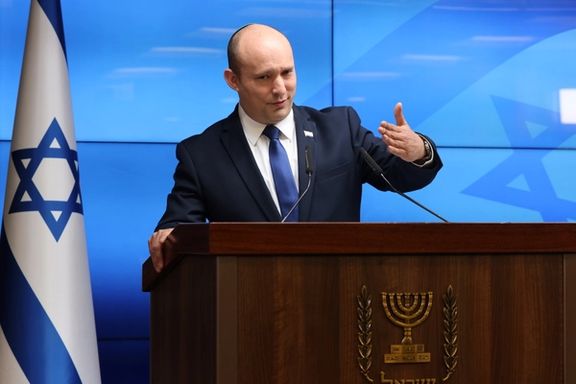
Israel’s former prime minister, Naftali Bennett, has called for the country’s leaders to launch an attack on Iran’s nuclear facilities as the Jewish state weighs its response to last week’s barrage of 181 ballistic missiles.
Bennet slammed US President Joe Biden who has called for a “proportionate” response to the attack as the administration continues its policy of appeasement.
"President Biden has said that Israel can retaliate against Iran, but must keep the response 'proportionate'. The president also urged Israel not to attack Iran’s nuclear program,” he wrote on X.
He called for Israel to attack Iran’s nuclear program, its leadership and Iran’s main economic interests such as energy, arguing that the Islamic Republic has not only twice attacked Israel this year, but has helped hundreds of other attacks by its proxies.
“All of these would be only a fraction of what Iran did to Israel. So indeed it won’t be “proportional”, it’ll be much less,” he said, calling to bring down the Islamic Republic before it acquires nuclear weapons.
“This will take some time, but this week’s response must start this process,” he said. “If we don’t take out the nuclear program now, I don’t know we’ll ever do it. The mullah regime has acquired SQ10, which means enough high grade uranium to produce 10 nuclear bombs. The regime is racing towards producing the detonator device itself, while the world can no longer really track this,” he warned.
Earlier this year, the UN’s nuclear chief, Rafael Grossi, also warned that Iran is “weeks not months” away from a nuclear weapon while the country continues to bar at least one third of the UN’s inspectors.
“We might wake up to a test bomb exploding in Iran’s desert. At that moment the Middle East will become a nuclear nightmare. We have the justification and the ability. It’s time to act now,” Bennett added.
On the eve of October 7, when Iran-backed Hamas invaded Israel, Bennett also highlighted the wide reach of Iran’s proxies which have been armed and trained by Iran sitting across Israel’s borders and beyond.
Since October 7, Iran’s proxies in Lebanon, Syria, Iraq and Yemen have all launched attacks on Israel in allegiance with Hamas in Gaza.
“Iran has been terrorizing Israelis for over 30 years. It sent its terror-octopus tentacles —Hamas, Hezbollah, Islamic Jihad and more to surround and attack Israel. Iran’s regime funded, trained and armed these savage terrorists,” Bennett said.
Hezbollah alone, Iran’s largest proxy, has sent over 8,000 projectiles towards Israel since October 8. Since then, at least 63,000 Israelis have been displaced and tens of thousands more Lebanese displaced in Hezbollah-controlled southern Lebanon.
Israel has since launched a ground invasion in recent days into southern Lebanon, targeting Hezbollah's terror network including tunnels, weapons storage and launchers, in a bid to push back the group designated by countries including the US and Europe, as it tries to send its citizens home.
“A few days ago Iran directly shot 190 ballistic missiles to Israel, including city centers such as Tel Aviv. In April Iran lobbed some 350 projectiles towards Israel. Without Israel’s remarkable technology these missiles could have killed thousands of innocent people,” Bennett pointed out.
In April, Iran launched its first direct attack on Israel following an alleged Israeli airstrike on the Iranian consulate in Damascus which killed a senior Quds Force commander and multiple high ranking IRGC officials.
“So what would be a proportionate response? For Israel to murder, rape and burn thousands of innocent Iranians? We don’t do that,” Bennett added. “For Israel to shoot 10,000 rockets indiscriminately on Iranian cities? We don’t do that either. Therefore, Israel can do much less than what Iran’s regime did to us.”
Gabriel Noronha, the US State Department’s former Iran advisor, told Iran International: “A lot of what’s going to happen in Israel’s response is messaging to Iran on its nuclear program.
“Israel’s response to the April attack was a pinprick attack to an Iranian site, sending the message that there is the capability to hit these sites,” he said, Israel’s retaliation to the inaugural aerial bombardment in April hitting military sites including four small nuclear research facilities and the nearby Natanz uranium enrichment site.
Last week’s assassination of Hezbollah leader Hassan Nasrallah in an underground intelligence headquarters, “said Israel can hit depth, no matter how deep the bunker is,” said Noronha.
“My theory is in this case that Israel is doing a layered response, hitting a lot of Iran’s missile supply chain, warehouses, factories, oil infrastructure, maybe a refinery, but I think they will leave room to be able to escalate further. I suspect they’ll hit something like a centrifuge assembly factory.”
In June, the UN said that "while the [nuclear] Agency had not been able to verify the total stockpile of enriched uranium in the country since February 2021, it estimated that Iran maintains a total enriched uranium stockpile 30 times the amount allowable under the Plan of Action — including increased quantities of uranium enriched to 20 percent and 60 percent."
While the UN continues to urge Iran to readmit inspectors barred from the country, its nuclear chief says the chances are now unlikely.
Speaking in New York on the sidelines of the UN’s General Assembly, Rafael Grossi said: ”Unfortunately this ship has sailed.”
